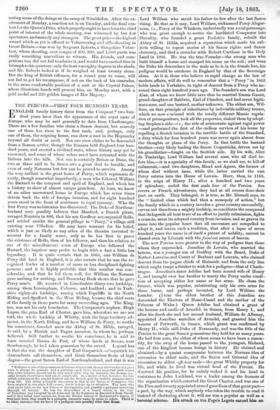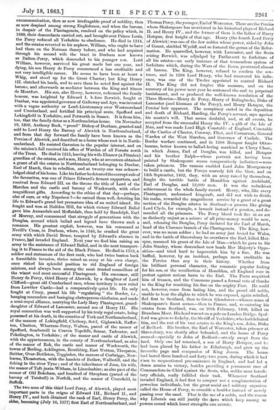THE PERCIES.—FIRST FOUR HUNDRED YEARS.
]INGLISH family history dates from the Conquest,* two hun-
• Pedigree is one of the permanent delusions of mankind, though the founder of a great race is always its greatest and a plebeian—and there seems noprinui fade reason why some families should not be very much older, why, for instance, the Roman con - solar houses should have died out so completely. As a matter of fact, however, the tide which submerged the empire washed out the record, and the modern patriciat starts from 600. The oldest proveable succession is that of the Ranee of Oodeypore, who have reigned in one place 3,00 years; but it is kept up by adoptio n. The man who died about 1030, as the last Prince of the Captivity, had possibly a pedigree stretching through all history. Ile was the descendant of a family which, in the time of Domitian, was accepted by all Jews and by the Emperor as descended from David, and if that belief were correct, as, from the similar history of Mohammed's family, it may have been, that would be a pedigree traceable name by name to Adam. There no other instance that we know of a pedigree even possibly older than Toro, 1.4 years later than the appearance of the royal caste of Europe, who may be said generally to date from Charlemagne. There are a few families who claim a Saxon descent, but scarcely one of them has risen to the first rank, and, perhaps, only one of them, the reigning house, can show a root in the Heptarchy beyond all doubt or cavil. Not one even claims to be descended from a Roman settler, though the Romans held England four hun- dred years, and erected a civilized state, whose history may yet be recovered, and some of whose rulers must have retreated with the Britons into the hills. Not one is certainly Briton or Dane, the two or three said to be Saxon owe a great deal to heralds, and even of early Normans but few can be proved to survive. Among the very earliest is the great house of Percy, which represents di- rectly, though somewhat imperfectly, a man who followed William the Bastard to the conquest and spoil of England, and which has a history to show of almost unique grandeur. At least, we know of no other uncrowned house in Europe which has seven times '.driven back the tide of foreign invasion, and for eight hundred years stood in the front of resistance to regal tyranny. Who the
- first Percy was no historian has discovered. The Duke of Northum- berland very possibly believes that Manfred, a Danish pirate, ravaged Neustria in 886, that his son Geoffrey accompanied Rollo, and settled amidst the general pillage in "Percy," a village still existing near Villedieu. He may have warrant for his belief, which is just as likely as any other of the theories invented to account for a family name, only as he has first to prove the existence of Rollo, then of his follower, and then his relation to one of the miscellaneous scum of Europe who followed the Bastard, the inquirer may prefer to begin with a fact a little less legendary. it is quite certain that in 1066, one William de Percy did land in England, it is also certain that he was the re- -cognized leader of a number of more or less disciplined fighting persons ; and it is highly probable that this number was con- siderable, and that he led them well, for William the Norman gave nothing for nothing, and Domesday Book shows that he gave Percy much. He received in Lincolnshire thirty-two lord.ships, among them Immingham, Caborne, and Ludford ; and in York- shire eighty-six lordships, among which Topcliffe in the North Riding and Spofford in the West Riding, became the chief seats of the family in those parts for many succeeding ages. The King, too, was not his only benefactor. The Conqueror's nephew, Hugh Lupus, the grins Earl of Chester, gave him, wherefore we are not told, the whole lordship of Whitby, with the large territory ad- jacent, in the North Riding, and here William de Percy, to soothe his conscience, founded anew the Abbey of St. Hilda, ravaged, he said, by a Danish and Pagan ancestor, in whom he, perhaps, believed. Still further to soothe his conscience, he is said to have married Emma de Post, of whose lands at Semar, near Scarborough, he had taken possession by the sword. Legend has it that she was the daughter of Earl Gospatrick—Coepatrick his descendants call themselves, and think themselves Scots of high degree—the great Saxon Earl of Northumberland, and that it was Lord William who saved his father-in-law after the last Saxon rising. Be that as it may, Lord William, nicknamed Percy Alsger- nons, i.e., Percy of the Whiskers, undoubtedly was a real personage, who was great enough to coerce the hardfisted Conqueror into liberality, who founded a great Yorkshire family, rebuilt the Abbey of St. Hilda, acquired a reputation which made his sub- jects willing to repeat stories of his Saxon rights and Saxon clemency, and died a crusader with Robert Curthose in the Holy Land in 1096. He was the true Founder—the strong man who built himself a house and stamped his name on the soil ; and were the Duke his descendant in the male as he is in the female line,-his pedigree would be outshone in England by that of the Sovereign alone. As it is, those who believe in rapid change as the law of modern affairs, will do well to remember that a " Percy " in 1863 holds lands in Yorkshire, in right of descent from a Percy who an- nexed them eight hundred years ago. The founder's son was Lord Alan, of whom we know little save that he married Emma Gaunt, grand-daughter of Baldwin, Earl of Flanders, and had seven legiti- mate sons, and one bastard, mother unknown. The eldest son, Wil- liam, on that principle of inheritance by indivisible military tenure, which we now confound with the totally different Mosaic regula- tion of primogeniture, took all the properties, staked them by adopt- ing Stephen's side—i.e., the side of aristocratic against regal power —and performed the first of the endless services of his house by repelling a Scotch invasion in the terrible battle of the Standard, a duty which for four hundred years was never again absent from the thoughts or plans of the Percy. In that battle the bastard brother—very likely leading the Saxon Cospatricks, driven out by his grandfather—fought on the Scottish side. By his wife, Alice de Tonbridge, Lord William had several sons, who all died be- fore him,—it is a specialty of this family, as we shall see, to kill off collaterals,—and two daughters, Maud and Agnes, the former of whom died without issue, while the latter carried the vast Percy estates into the House of Lovain. Here, then, in 1168, in the reign of Henry II., after a hundred and two years of splendour, ended the first male line of the Percies. Sea rovers or French adventurers, they had at all events done their part on earth. They belonged, it is true, as Mr. Disraeli says, to the "limited class which had then a monopoly of action," but the family which in a century invades a great country successfully, carves out therefrom a mighty lordship, so conciliates the conquered that its legends all bear trace of an effort to justify submission, fights a crusade, saves its adopted country from invasion, and so graves its name into the popular heart that all successors are compelled to adopt it, and leaves such a tradition, that after a lapse of seven hundred years the name is of itself a patent of nobility, cannot be- classed even by Liberals with the faine'ant eaters of beeves.
The new Percies were greater in the way of pedigree than those whom they superseded. Josceline de Lovain, who married the heiress, was a younger son of Godfrey with the Beard, Duke of Nether-Lorraine and Count of Brabant and Louvain, who claimed descent from the pagan chiefs of Hainault, and from the only line which might tempt a thinker to wish for a pedigree—that of Charle- magne. Josceline's sister Adelise had been second wife of Henry I., and brought over her brother to marry the Percy under condi-
tion of accepting either her name or her arms. He chose the
former, which was popular, substituting only his own arms for those borne, and perhaps invented, by Lord William the founder. (From the eldest brother of this Josceline are descended the Electors of Hesse-Cassel and the mother of the Princess of Wales.) Queen Adelise had obtained a grant of
the honour and castle of Arundel, in Sussex, from Henry 1., and
after his death she and her second husband, William de Albeney, appointed Josceline eastellan of Arundel, and granted him the honour of Petworth, in Sussex, which grant was confirmed by Henry IL, while still Duke of Normandy, and was the title of the Percies to the great Sussex possessions they held for so many years.
He had four sons, the eldest of whom seems to have been a nonen- tity, for the sway of the house passed to the youngest, Richard, one of the kingliest human beings in history. He claimed and
obtained—by a quaint compromise between the Norman idea of
succession to eldest male, and the Saxon and Oriental idea of succession to eldest efficient male—the great Whitby property for life, and while he lived was virtual head of the Percies. He deserved his position, for he calmly staked it and his head in resistance to John Laekland, was a leader among the framers of
the organization which extorted the Great Charter, and was one of the Five-and-twenty appointed armed guardians of that great pact — a pact, by the way, which anybody who takes the trouble to read it instead of chattering about it, will see was a popular as well as a baronial scheme. }De attack on the Pope's Legate earned him an
The two sons of this third Lord Percy, of Alnwick, played most important parts in the reigns of Edward HI., Richard IL, and Henry IV., and both Obtained the rank of Earl, Henry Percy, the elder, becoming (July 16, 1377) first Earl of Northumberland, and had lasted three hundred and forty-two years, during which it had r:sen to unquestioned pre-eminence in England, and had led a dozen armies to victory, besides providing a permanent race of
Commanders-in-Chief against the Scots, who, unlike most heredi- tary officials, really fulfilled their task. Whenever Scotland
invaded England, it had first to conquer not a conglomeration of powerless individuals, but the great social and military organism called the House of Percy, to crumble a boulder instead of merely
passing over the sand. That is the use of a noble, and the reason why Liberals can still justify the laws which keep among us powers round which lesser strengths can accrete,































 Previous page
Previous page